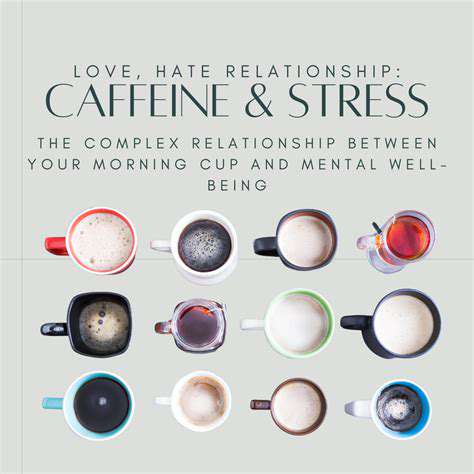Understanding Caffeine Induced Anxiety: Causes and Solutions


Strategies for Managing Caffeine-Induced Anxiety
Understanding the Effects of Caffeine on Anxiety Levels
Caffeine is a central nervous system stimulant that can increase alertness and reduce fatigue, but it also has the potential to heighten anxiety symptoms in sensitive individuals. When consumed in excess, caffeine can lead to nervousness, restlessness, and rapid heartbeat, which mimic or exacerbate anxiety disorders. Recognizing how caffeine influences your body's stress response is essential for managing its effects effectively.
Research indicates that caffeine stimulates the release of adrenaline, the body's fight-or-flight hormone, which can trigger feelings of panic and anxiousness. For some people, even small amounts of caffeine can cause significant increases in heart rate and agitation, leading to a vicious cycle of anxiety and caffeine consumption. Awareness of these effects allows individuals to make informed choices regarding their caffeine intake.
Identifying Personal Caffeine Tolerance and Sensitivity
Each person metabolizes caffeine differently based on genetic factors, age, weight, and overall health. Some individuals are highly sensitive and may experience anxiety symptoms after consuming as little as one cup of coffee, while others tolerate higher amounts without issue. Paying close attention to your body's reactions can help determine your personal tolerance level.
Keeping a consumption diary over several days can reveal patterns and triggers related to caffeine intake and anxiety episodes. This personalized approach enables you to adjust your intake appropriately, reducing the likelihood of adverse effects while still enjoying the benefits of caffeine responsibly.
Implementing Gradual Caffeine Reduction Techniques
Suddenly stopping caffeine can lead to withdrawal symptoms such as headaches, irritability, and increased anxiety. A more sustainable approach involves gradually decreasing your caffeine consumption over a period of days or weeks. For example, if you typically drink three cups of coffee daily, reducing to two cups for a week, then one, can help your body adjust smoothly.
This slow reduction minimizes withdrawal symptoms and allows your nervous system to recalibrate, ultimately decreasing caffeine-induced anxiety. Incorporating caffeine-free days into your routine can further support this process, making it easier to manage your intake without feeling deprived.
Switching to Lower-Caffeine or Decaffeinated Alternatives
One effective strategy to manage anxiety related to caffeine is to replace high-caffeine beverages with lower-caffeine or decaffeinated options. Herbal teas, for example, contain little to no caffeine and can be soothing substitutes that help maintain hydration and comfort.
Decaffeinated coffee and tea provide similar flavors and rituals without the stimulating effects of caffeine. Gradually substituting these beverages allows you to enjoy your usual routines while reducing the risk of anxiety spikes caused by caffeine. This switch can be particularly beneficial during stressful periods or late in the day when sensitivity may be heightened.
Incorporating Relaxation and Stress-Reduction Techniques
Alongside managing caffeine intake, practicing relaxation techniques such as deep breathing, meditation, or progressive muscle relaxation can help mitigate anxiety symptoms. These methods activate the parasympathetic nervous system, promoting calmness and reducing stress hormones.
Regularly dedicating time to mindfulness exercises can improve your resilience to caffeine-related anxiety triggers. Combining these practices with reduced caffeine consumption creates a comprehensive approach to maintaining emotional balance and preventing anxiety episodes.
Monitoring Dietary and Lifestyle Factors that Influence Anxiety
In addition to caffeine, other dietary and lifestyle factors can contribute to heightened anxiety levels. Excessive sugar intake, dehydration, lack of sleep, and high-stress environments can amplify caffeine’s effects on your nervous system.
Adopting a balanced diet rich in whole foods, staying well-hydrated, and ensuring adequate rest are crucial components of anxiety management. Lifestyle modifications, such as regular exercise and limiting alcohol consumption, further support your efforts to control caffeine-induced anxiety symptoms effectively.
Seeking Professional Help When Necessary
If caffeine-induced anxiety persists despite self-management strategies, consulting a healthcare professional is advisable. Mental health experts can offer personalized guidance, help identify underlying issues, and recommend appropriate therapies or medications if needed.
Furthermore, working with a dietitian or nutritionist can assist in developing a sustainable caffeine reduction plan tailored to your individual needs. Addressing anxiety comprehensively ensures better long-term outcomes and improves overall well-being.